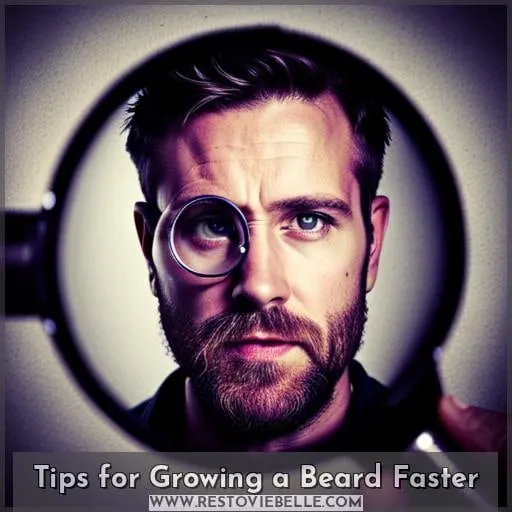This site is supported by our readers. We may earn a commission, at no cost to you, if you purchase through links.
 Imagine the feeling of power and confidence that comes with growing a full beard. You’ve probably wondered how long it takes to achieve that level of facial hair mastery. Well, you’re in luck! This article dives into the science behind beard growth and provides tips on how to speed up the process.
Imagine the feeling of power and confidence that comes with growing a full beard. You’ve probably wondered how long it takes to achieve that level of facial hair mastery. Well, you’re in luck! This article dives into the science behind beard growth and provides tips on how to speed up the process.
From understanding the phases of beard growth to exploring genetic influences, this guide has everything you need for your journey towards an impressive mane.
Table Of Contents
- Key Takeaways
- How Long Does It Take?
- The Phases of Beard Growth
- Understanding the Science of Beard Growth
- What to Expect When Growing a Beard
- Tips for Growing a Beard Faster
- The Role of Genetics in Beard Growth
- The Influence of Hormones on Beard Growth
- Can You Speed Up Beard Growth?
- How to Improve the Thickness of Your Beard
- TL;DR
- Frequently Asked Questions (FAQs)
- Conclusion
Key Takeaways
- On average, it takes 2 to 4 months to grow a full beard.
- Factors such as age, ethnicity, genetics, hormones, diet, and sleep can affect beard growth.
- Terminal beard growth is typically expected between the late 20s and early 30s.
- Genetics, hormones, and lifestyle factors like diet and exercise play a significant role in the rate and thickness of beard growth.
How Long Does It Take?
When it comes to growing a full beard, the time it takes can vary from person to person.
Factors such as genetics, age, hormones, and ethnicity all play a role in how long it will take for your beard to grow.
On average, it may take around 2 to 4 months for a full beard to grow.
However, some men may reach their terminal beard (maximum thickness and length) in their late 20s or early 30s while others may not reach this stage until their 40s or 50s.
Factors Affecting Beard Growth
To determine how long it takes to grow a full beard, you need to consider several factors that affect the rate of beard growth.
Age, ethnicity, genetics, hormones, diet, and sleep all play a role in determining how quickly your beard grows.
For example, men with higher levels of testosterone and DHT tend to have thicker and faster-growing beards.
Additionally, maintaining a healthy lifestyle with proper nutrition and rest can promote optimal hair growth.
Terminal Beard
You can typically expect to reach your terminal beard, the point at which your beard has reached its full thickness and length potential, between your late 20s and early 30s.
Factors such as genetics, hormones, and diet can influence the age of terminal beard.
Patchy terminal beards are common due to uneven hair growth patterns on the face.
To achieve a terminal beard, focus on maintaining a healthy lifestyle with proper nutrition and exercise to promote optimal testosterone levels for facial hair growth.
The Phases of Beard Growth
As you embark on your journey to grow a full beard, it’s important to understand the different phases of beard growth.
These phases consist of vellus, terminal, anagen, catagen, and telogen.
The vellus phase is when fine and light-colored hair begins to appear on your face. This hair will eventually transition into the terminal phase where it becomes thicker and darker.
During the anagen phase, which is considered the active growth stage of your beard follicles, new hairs are continuously produced at a rapid rate. This can last for several years before transitioning into the catagen phase where growth slows down.
Lastly comes the telogen phase where individual hairs rest before falling out naturally or being replaced by new ones in subsequent cycles.
Understanding these phases allows you to better care for your growing beard by choosing appropriate grooming techniques and products tailored towards each stage.
Understanding the Science of Beard Growth
Understanding the science behind beard growth can help you better navigate the process of growing a full and healthy beard.
- Genetics: Your genes play a significant role in determining how thick and fast your beard grows. If your father or grandfather have had thick beards, chances are you’ll too.
- Hormones: Testosterone and DHT (dihydrotestosterone) hormones influence the rate of your beard growth. Higher levels of these hormones tend to result in thicker and faster-growing beards.
- Diet and Exercise: A healthy lifestyle promotes healthy hair growth, including on your face! Eating a balanced diet rich in protein, vitamins (especially biotin), exercising regularly, managing stress levels, drinking enough water – all contribute to optimal conditions for robust facial hair development.
By understanding these scientific aspects of beard growth, you can take steps towards achieving the luscious mane you desire while embracing patience as it takes time for different individuals.
What to Expect When Growing a Beard
When it comes to growing a beard, there are several things you can expect along the way.
First and foremost, be prepared for some patience and perseverance. Growing a full beard takes time, typically around 2 to 4 months. During this time, you may experience some challenges such as a patchy beard or slower growth in certain areas like your cheeks.
To help address these issues and promote healthy growth, there are various strategies you can try.
- Using beard oil or balm: These products moisturize the skin beneath your facial hair and promote healthier hair follicles.
- Trying out different styles: If certain areas of your beard aren’t growing as quickly as others, experimenting with different styles can help create an even look.
- Taking supplements: Some individuals opt for supplementing their diet with vitamins specifically formulated to support hair growth.
It’s important to note that while these methods may improve the appearance of your beard by promoting better growth patterns or filling in patches temporarily, they don’t guarantee permanent results. In cases where natural remedies don’t yield desired outcomes, individuals may consider more advanced options like undergoing a Beard Transplant procedure which involves transplanting hairs from other parts of the body onto the face.
Remember that everyone’s journey towards achieving their ideal bearded look is unique! Embrace any setbacks along the way knowing that no matter how long it takes or what obstacles arise during this process – ultimately success will come through dedication coupled with proper care techniques tailored specifically towards one individual’s needs.
Tips for Growing a Beard Faster
To grow a beard faster, there are several tips you can follow:
- Make sure you’re eating right by including fruits, vegetables, whole grains, and lean proteins in your diet.
- Exercise regularly to promote healthy blood flow and hair growth.
- Get enough sleep to reduce stress levels and allow your body time to regenerate hair follicles.
- Drink less alcohol and more water to keep your skin hydrated for optimal beard growth.
Eating Right
To grow a beard faster, you need to focus on eating the right foods that promote healthy hair growth.
Incorporate fruits and vegetables into your diet for their vitamins and minerals.
Avoid processed foods as they can negatively impact hair growth.
Make sure you’re getting enough protein, which is essential for strong and healthy hair.
Consider taking biotin supplements to support beard growth.
Lastly, drink plenty of water to keep your body hydrated, including your facial hair follicles.
Exercising
To further accelerate the growth of your beard, incorporate regular exercise into your routine.
Exercise increases testosterone levels, which can promote healthy hair growth.
It also reduces stress and improves sleep quality, both of which contribute to optimal beard growth.
Additionally, exercise improves circulation throughout the body, including the facial area, supplying essential nutrients to hair follicles for better beard development.
So get moving and watch your beard flourish!
Getting Enough Sleep
Make sure you’re getting enough sleep to promote faster beard growth.
Sleep plays a crucial role in the process of growing a beard.
Lack of sleep can negatively affect your body’s hormone production, including testosterone, which is essential for healthy hair growth.
Aim for at least 8 hours of quality sleep each night to optimize your beard-growing potential and prevent any potential loss or thinning caused by sleep deprivation.
Managing Stress Levels
Continue to support your beard growth journey by actively managing the stress levels in your life.
Incorporate practices such as meditation, deep breathing, and yoga into your daily routine to help reduce stress levels.
Engaging in regular exercise not only helps relieve stress but also promotes blood circulation and nutrient delivery to the hair follicles for optimal beard growth.
Additionally, maintaining a healthy diet rich in vitamins and minerals supports overall hair health and encourages faster beard growth.
Positive thinking techniques like affirmations can also contribute to reducing stress levels and promoting a positive mindset for better results on your bearded journey.
Drinking Less Alcohol and More Water
Cut back on alcohol consumption and increase your water intake to promote faster beard growth.
Alcohol can slow down hair growth, so reducing your alcohol consumption will benefit your beard.
On the other hand, water helps hair growth by keeping the follicles hydrated and promoting overall health.
Additionally, using products like beard oil, shampoo, and conditioner specifically designed for facial hair can further enhance its growth potential.
Incorporate these tips into your routine for optimal results in growing a fuller beard faster.
The Role of Genetics in Beard Growth
Genetics play a significant role in determining the growth and thickness of your beard.
- Family history: Your genes, passed down from your family, have a major impact on the potential thickness and speed of your facial hair growth. If you come from a line of men with thick beards, chances are you’ll have similar results.
- Ethnicity: Different ethnicities tend to exhibit varying levels of facial hair growth. For example, individuals with Mediterranean descent generally have thicker beards compared to Chinese men.
- Hormones: Hormones like testosterone and DHT contribute to the development of facial hair by stimulating follicles’ activity in certain areas such as cheeks or chin.
- Age & Gender: The optimal age for robust beard growth is between 25-35 years when testosterone levels peak; however gender also plays an important role as women typically lack high levels necessary for full-fledged beard development.
The Influence of Hormones on Beard Growth
Moving on from the role of genetics in beard growth, let’s now explore the influence of hormones on your beard journey.
Hormones such as testosterone and DHT (dihydrotestosterone) play a crucial role in determining the thickness and speed of your beard growth. Men with higher levels of these hormones tend to have faster-growing and thicker beards.
Testosterone is responsible for stimulating hair follicles to produce new hair, including facial hair. As men reach their peak testosterone levels between 25 to 35 years old, this period is often associated with optimal beard growth potential.
DHT, a derivative hormone from testosterone, also plays a significant role in promoting facial hair development. It binds to receptors within the hair follicles on your face and stimulates them for robust growth.
To better understand how hormones affect different aspects of growing a full beard at different ages or stages in life due to hormonal fluctuations:
| Age | Testosterone Levels | Beard Growth Potential |
|---|---|---|
| Early teens | Low | Minimal |
| Late teens | Increasing | Sparse |
Remember that while hormones are essential contributors to healthy facial hair development, they aren’t solely responsible for it. Other factors like genetics and overall health also come into play when it comes to achieving that desired rugged look.
Can You Speed Up Beard Growth?
To further enhance your beard growth, you can actually speed up the process by implementing certain practices and habits. While genetics and hormones play a significant role in determining the rate of beard growth, there are a few things you can do to potentially accelerate it.
Firstly, consider avoiding frequent shaving as it doesn’t stimulate hair follicles or make your beard grow back thicker. Additionally, incorporating products like beard oil can help keep your skin moisturized and promote healthier hair growth.
Some people also opt for using supplements that contain biotin or minoxidil to encourage faster facial hair development. However, it’s important to note that individual results may vary when trying these methods for speeding up beard growth.
How to Improve the Thickness of Your Beard
To achieve a thick and luscious beard, there are several factors to consider.
- Genetics play a significant role in determining the thickness of your beard, but there are steps you can take to improve it.
- Age is another factor as younger men tend to have higher testosterone levels that promote beard growth.
- Exercise increases blood flow and circulation, which can stimulate hair follicles for better growth.
- A healthy diet rich in protein and vitamins nourishes the hair follicles from within for optimal growth.
- Managing stress levels is important because high-stress situations can lead to hair loss or stunted growth.
By incorporating these tips into your routine, you can enhance the thickness of your beard naturally.
- Focus on genetics: Understand how your genes influence facial hair patterns.
- Consider age: Know that hormone changes affect facial hair density as you get older.
- Prioritize exercise: Regular physical activity boosts blood circulation promoting healthier beards.
- Optimize diet: Consume nutrient-rich foods such as proteins and vitamins essential for robust facial hair development.
- Manage stress effectively: High-stress levels may hinder proper hormonal balance leading to weaker beards.
By following these guidelines with consistency, patience becomes more manageable while striving towards achieving a thicker-looking mane upon one’s face!
TL;DR
Now let’s quickly summarize the key points about growing a full beard in the TL;DR section.
Growing a full beard takes patience, time, and confidence.
Beard growth rates vary for everyone, but on average it grows about ½ inch per month.
The amount of hair you can grow is influenced by genetics and hormones like testosterone and DHT.
Maintaining a healthy lifestyle with proper diet, exercise, sleep, stress management,and hydration helps promote healthy beard growth.
Trust the process and don’t give up!
It typically takes 2 to 4 months to grow a full beard,but this varies depending on factors like age and ethnicity.
Some men may not reach their terminal beard until their late twenties or early thirties.
You can try strategies such as eating right,reducing stress levels,and letting your facial hair grow longer to improve your chances of faster or thicker growth.
Frequently Asked Questions (FAQs)
Can shaving your beard make it grow back thicker and fuller?
Shaving your beard doesn’t make it grow back thicker or fuller. This is a common myth.
The rate and thickness of your beard growth are determined by genetics, hormones, age, and other factors.
Is it possible to grow a full beard by the age of 20?
Growing a full beard by the age of 20 is possible for some individuals, but it depends on various factors such as genetics, hormones, and ethnicity. It’s important to have realistic expectations and focus on maintaining a healthy lifestyle to promote beard growth.
What can I do if I have a patchy beard and want to grow hair on my cheeks?
To grow hair on your cheeks and address a patchy beard, focus on:
- Maintaining a healthy lifestyle with proper nutrition, exercise, sleep, stress management.
- Considering using beard growth oils or serums to stimulate hair growth.
Do beard oils really work in promoting beard growth?
Beard oils can help promote beard growth by:
- Moisturizing the skin and hair follicles,
- Preventing dryness and breakage.
However, their effectiveness may vary depending on individual factors such as genetics and overall beard care routine.
Can growing a beard make you go bald?
Growing a beard doesn’t make you go bald. It’s a myth, my friend.
Baldness is determined by genetics and hormones, not your facial hair choices.
Embrace the power of both your beard and your luscious locks!
Conclusion
Unlocking your bearded potential and growing a full beard is an exciting journey that requires patience and understanding. The time it takes to achieve a full beard varies depending on individual factors and genetics.
By embracing the phases of beard growth, understanding the science behind it, and implementing tips such as proper nutrition, exercise, and stress management, you can potentially speed up the process.















